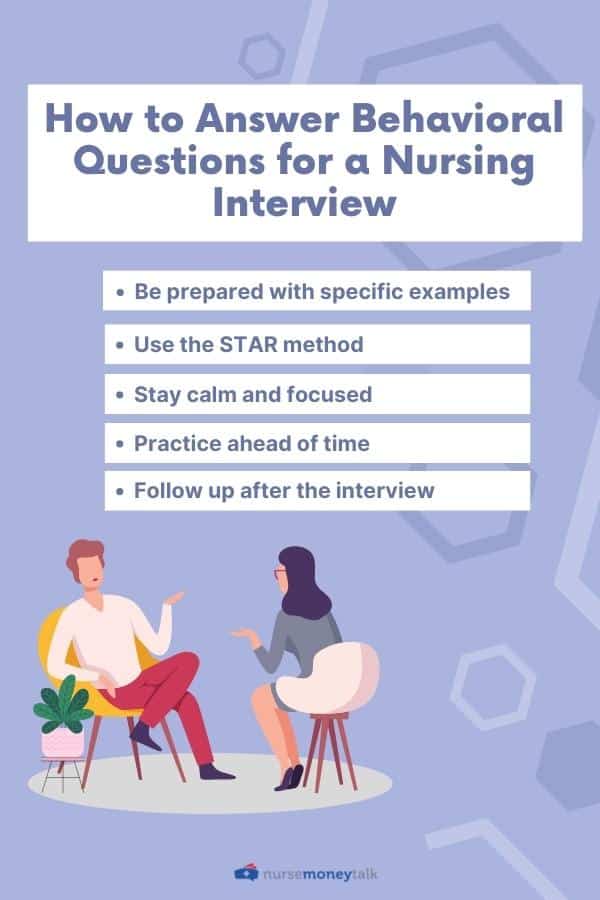Behavioral questions are designed to assess how you have handled situations in the past and whether you have the skills necessary to excel in the role you are interviewing for.
In a nursing interview, behavioral questions will likely focus on your bedside manner, your ability to handle difficult situations, and how you work within a team.
How to Answer Behavioral Questions for a Nursing Interview

Behavioral interview questions ask you to describe how you have handled a situation in the past.
They are designed to give the interviewer a sense of how you would handle a similar situation in the future.
Here are some tips on how to answer behavioral questions in a nursing interview:
- Be prepared with specific examples
- Use the STAR method
- Stay calm and focused during the interview
- Practice ahead of time
- Follow up after the interview
Let’s take a closer look at each of these steps.
1. Be prepared with specific examples
When preparing for your interview, take some time to think about specific examples of times when you displayed the behavior or skill the interviewer is asking about.
For example, if you’re asked about a time when you had to deal with a difficult patient, think of a specific instance where you were able to diffuse the situation and provide excellent care.
Having specific examples will make your answers more convincing and believable.
2. Use the STAR method
When answering behavioral questions, it’s helpful to use the STAR method: describe the Situation, Task, Action, and Result of the situation you’re describing.
This will help you give a well-rounded answer that covers all the bases.
For example, if you’re asked about a time when you went above and beyond for a patient, you could say something like
“There was a situation where a patient was extremely agitated and refused to listen to anything we said. I took it upon myself to calm them down by speaking in a soothing voice and explaining everything we were doing step-by-step. As a result, the patient calmed down and was much more cooperative.”
3. Stay calm and focused during the interview
It can be easy to get flustered during an interview, but it’s important to stay calm and focused so you can answer the questions clearly and confidently.
If you’re unsure how to answer a question, take a deep breath and ask if the interviewer can clarify what they’re looking for. Chances are, they’ll be happy to help you out.
4. Practice ahead of time
As with any interview question, it’s always helpful to practice ahead of time so you can be as prepared as possible.
Ask a friend or family member to help you role-play an interviewer so you can get comfortable answering behavioral questions out loud.
The more practice you have, the better equipped you will be to handle anything that comes your way on interview day.
5. Follow up after the interview
Finally, be sure to follow up after your interview with a thank-you note or email thanking the interviewer for their time and reiterating your interest in the position.
This is just one more way to make sure you stand out from the other candidates and show that you’re serious about getting the job.
Common Nursing Interview Questions and How to Answer Them
Here are some common nursing interview questions (some behavioral) that you’ll encounter during your interview.
1. Tell Me About Yourself.

The most common interview opening question is “Tell me about yourself.”
By asking this, the interviewer hopes to gain insight into your values, beliefs, passions, and what makes you unique.
They want to see your story and the path that you took to become a nurse, and they also want to know why you are applying for the position offered.
Answer
” My name is Joanna; I was born in Aurora, a small town near Chicago. My family had a farm, and I, together with my three siblings, was expected to help out with farm chores.
I moved to Chicago to complete my nursing education and love living here.
I’m still close with my family and grateful to them for giving me a childhood that taught me how to prioritize tasks and how to be dedicated and efficient at multitasking, as I was used to balancing farm duties with homework and leisure every day before I even left school and started nursing.
My sister is battling a chronic condition, and she has inspired me to help people navigate their treatment plans and learn more about chronic pain management.
Now, I want to work for you as a nurse anesthesiologist.”
2. Do You Work Well With Other Nurses And Healthcare Professionals?

Every nurse needs to work as a part of the healthcare team. Working well with doctors, other nurses, and ancillary staff is important to your job.
Good teamwork provides better patient outcomes, increases job satisfaction, and ensures patient safety throughout their stay in a healthcare facility.
Emphasize your interpersonal skills in your answers, such as patience and active listening.
Answer
“I have learned how important it is to communicate with interdisciplinary team members when caring for patients.
Once, I had a patient who came up to me to say he had been waiting for 20 minutes for his medication.
I was new to that unit, so before I gave the patient his medication, I decided to check with the nurse assigned to this patient.
It turned out that the patient had Alzheimer’s, and the attending nurse had already given him the medication.
This incident stayed with me throughout all the years to remind me how important teamwork and communication are.”
3. What Is Your Biggest Strength?
This question is often asked in healthcare interviews. It is very challenging to answer.
You want to show your hiring person that you are a qualified professional who can contribute and add value to the healthcare facility.
Answer
“One of my biggest strengths is managing my time and multitasking with tight deadlines effectively. I pride myself on always prioritizing tasks and completing them on time.”
4. What Is Your Biggest Weakness?
This is a tricky question because you need to show the interviewer that you are self-aware and sincere when you show your potential weakness.
Try to relate your answer to healthcare instead of focusing on a personal weakness. The most commonly chosen weaknesses are perfectionism and over-commitment.
You can stick with these or choose something else when composing your model answer.
Answer
“I am a perfectionist, which sometimes causes me to try to do too many tasks myself instead of delegating.
I must say, in some cases, it has worked in my favor in that the tasks were done correctly, but I do understand that healthcare professionals should be able to multitask and prioritize, and therefore not delegating is holding me back.
I am working on that by taking an online course on improving at delegating tasks.”
5. How Do You Think Healthcare Will Change In The Future?

By asking this question, the interviewer wants to identify how you can connect personal healthcare career goals with the organization’s goals.
Try to choose to discuss future industry innovations or challenges. To do this thoroughly, you need to understand how the changes in the healthcare industry will impact the healthcare organization.
Share your views on healthcare delivery changing in the coming years.
Answer
“I anticipate that healthcare organizations will need to change how healthcare is delivered to communities, and a larger focus will need to be placed on preventive medicine to keep the population as healthy as possible.
When communities are encouraged and properly taught strategies to prevent disease, fewer people will need hospitalization, and healthcare organizations will be able to deliver care that focuses on patient satisfaction and provides sufficient resources through diverse technologies.”
6. Why Should We Hire You?

When you answer this question, you should demonstrate your ability to think critically, acknowledge the value you add to healthcare organizations and let the interviewer know how your skill set will benefit the company.
Try to mention your skills and related experience to show how they align with the healthcare organization. Focus on how your strengths meet or exceed employer expectations.
Answer
“I have six years of medical-surgical nursing experience and highly developed nursing skills.
I am excited to join your team because of the organization’s strong focus on patient care and empathy, which are my priorities.
My previous experience at ABC University Hospital has taught me valuable communication, decision-making, and time-management skills.
I am confident that I can positively contribute to your organization.”
7. What Didn’t You Like About Your Last Job?
Even though it sounds like an invitation to get off your chest all that bothered you at the last place you worked, it isn’t.
Don’t talk about your previous boss, co-workers, or others disparagingly. Rather focus on how you were successful despite the challenges.
Answer
“I was given a chance to contribute in many ways and worked with staff in several key departments, so I learned a great deal, but my manager was not an individual to give praise or feedback, so it was difficult for me to gauge whether I was meeting the standards, which was frustrating.
The training was not provided constructively, but I did learn despite that.”
8. What Do You Love About The Nursing Profession?

This question aims at discovering your passion for nursing. So don’t be shy about letting your interviewer know what makes the work meaningful.
You can talk about the relationships you build with patients and opportunities for growth as a human being and a professional. You can also include your reasons for choosing a career in nursing.
Answer
“I love nursing because, out of all the healthcare professionals, I get to spend most of the time with patients.
I love seeing how patients recover after surgery or treatment.
I love to teach patients how to take care of themselves after they are discharged and how interacting with them impacts their lives.
I would love to make healthcare more accessible and convenient for people who truly need it.”
9. How Do You Manage Working In A High-Pressure Environment?

Individuals react to stress differently, so the interviewer wants to assess how you react in a stressful environment. Do you have any strategies you like to use to minimize and get over the stress?
Answer
“I am well organized, which helps me prioritize my workload and manage my time.
I can also identify potential problems early and resolve them by engaging my team or unit manager.
I also prioritize my mental health, and after work, I ensure I get enough rest and exercise to keep my mental health strong.
On weekends I socialize with friends and pursue handcrafting hobbies.”
10. How Would You Handle A Disagreement With A Doctor?

When you answer this question, emphasize your interpersonal skills, like active listening, teamwork, problem-solving skills, and the ability to follow the chain of command.
Mention that you will first approach the doctor to resolve the disagreement, and only when a resolution cannot be reached will you ask for help from a supervisor.
Answer
“Once I spotted a prescription that did not look right.
I approached the doctor, but he dismissed me, saying that the prescription was right. I then decided to ask my supervisor.
The supervisor called the doctor, and we reviewed the prescription together. The error was corrected, and the patient received the right treatment.”
Key Takeaways
The interviewers can spot candidates who take time and effort to prepare well for the interview and often reward that hard work with a job offer.
The above selection includes some of the more commonly asked questions. Use the sample answers to help you formulate personal responses. Good luck with job hunting.
Have You Read These Yet?
- Hard Medical-Surgical Nursing Interview Questions
- Hard Fertility Nursing Interview Questions
- Hard Forensic Nursing Interview Questions
- Hard Nurse Educator Interview Questions

